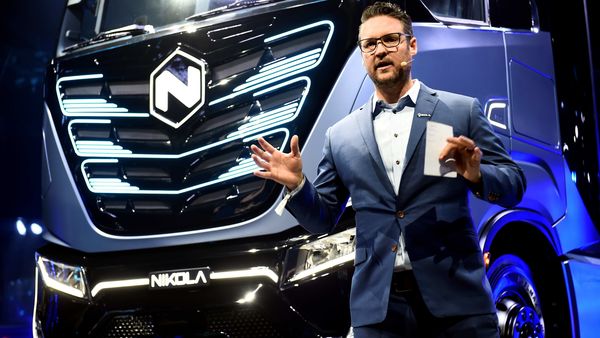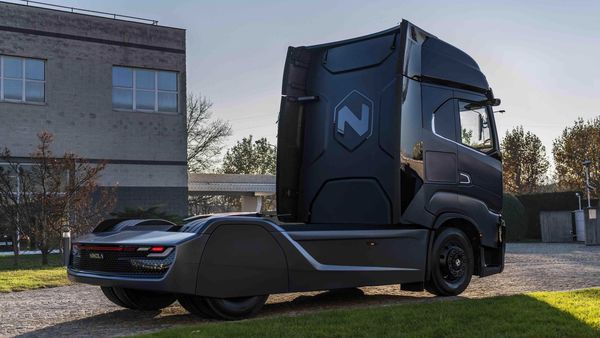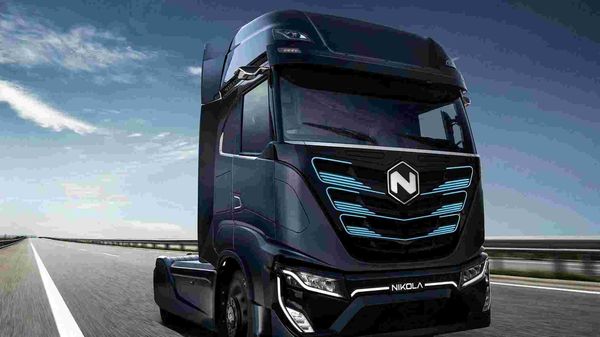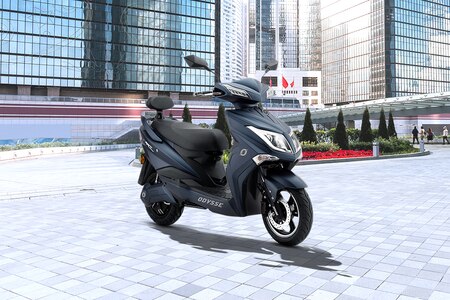EV startup Nikola founder Milton's fall reveals what his backers feared


Back in March, long before a short seller would raise questions about electric-truck company Nikola Corp. and hasten its founder’s exit, early investors in the company were expressing concerns of their own. Those investors, led by mutual-fund giant Fidelity Investments, were worried that Trevor Milton, for all his brash visionary talk and Twitter braggadocio, lacked the ability that Elon Musk possesses to deliver these sorts of newfangled products to market. They lobbied successfully to remove him as CEO before the company’s June IPO and for Milton’s father to leave the board, according to people familiar with the matter. When the deal was done, Milton only held the title of chairman, the post he resigned this month.
The back-room negotiations show that Milton’s past was a concern to investors months before General Motors Co. executives placed a bet on the company in a $2 billion deal carved out after the IPO. They liked Milton’s vision and his ability to raise cash and felt the venture was safeguarded from his shortcomings in operations by his push upstairs, say people familiar with the matter. Nonetheless, the events that have unfolded since the short-seller report, with Nikola’s stock plunging amid a steady stream of negative headlines, have exposed just how high the risks still were.
Also check these Vehicles
Now, it’s up to former GM Vice Chairman Steve Girsky, whose blank-check company VectoIQ took Nikola public via reverse merger in June, and Nikola CEO Mark Russell to stabilize the business and regain investor confidence. The plan with GM was to use Nikola’s hot stock and Milton’s ability to raise money to build a hydrogen-fueled trucking business with GM’s technology.
“There is obviously someone on the diligence side who isn’t going to get a nice bonus this year," said Reilly Brennan, founder of the venture capital fund Trucks Inc. “The best possible thing if you’re a shareholder is that Milton is no longer running the company and you have Girsky as chairman and GM providing technology."
The GM deal was originally scheduled to close Sept. 30, and the automaker has said it plans to carry through, but that timing may slip, say people familiar with the matter. BP Plc is still engaged with Nikola in talks to partner on a network of hydrogen fueling stations for fuel-cell trucks the company hopes to sell, but also is slowing the pace for a deal, said the people, who asked not to be identified discussing private information. BP and GM declined to comment.
Milton’s tale reads like a Greek tragedy. The report by short seller Hindenburg Research accused Milton of overhyping Nikola’s technology and has prompted investigations by the Justice Department and U.S. Securities and Exchange Commission. A cousin has accused him of a decades-ago sexual assault, which he denies. The company’s value peaked at $30 billion and is now worth about $7 billion.


Also Read : Nikola keeps promise, Trevor Milton gives 50 first employees share worth $233 mn
Girsky and GM Chief Executive Officer Mary Barra have both said publicly that they did plenty of due diligence. People familiar with the matter say that GM found out when scouting the deal that it had better batteries and fuel-cell technology but joined forces because Nikola had a working semi truck and access to capital markets. In addition, GM will get paid to build Nikola’s Badger pickup on existing assembly lines. Milton was so excited to get the Badger pickup program moving that he signed a deal that heavily favored GM, one of the people said.
Nikola’s stock and GM’s $2 billion stake are worth less than half what they were on Sept. 8, when the deal was announced. Milton’s own stake is worth $1.7 billion, down from almost $5 billion at one point.
Humble Beginnings
Milton said in a June interview with Bloomberg News that he grew up in modest surroundings in Layton, Utah. His family moved to Las Vegas when he was very young and he lost his mother to cancer shortly after moving back to Utah in the sixth grade. He wrote on Twitter he didn’t finish high school, earning an equivalency certification instead, and later dropped out of college. His Twitter account has since been deleted.
He grew up in a tight-knit Mormon family, according to Aubrey Smith, his first cousin. She went on social media recently and accused him of sexually assaulting her in 1999 when she was 15 and he was 17.
Also Read : Nikola slumps after no-details denial of short-seller report
In a public account on Facebook and Twitter, and repeated in a phone interview, Smith said that Milton came onto her at the funeral of their grandfather. He took her shirt off without permission, Smith wrote, and then he touched her inappropriately before someone knocked at the door and she ran out.
Milton denied the allegations through a spokesman.
Smith said Milton raised money from family members to get his start. He founded and ran several businesses, including a home-security company that Milton claims he sold for $1.5 million. Next, in 2009, he founded an e-commerce platform called Upillar.com, which Milton claims “pioneered the shopping cart online."
Clean Power


Then he got into clean propulsion but ended up embroiled in litigation with dHybrid Inc., which he founded in 2009. The company retrofitted diesel vehicles with natural-gas-burning turbines, claiming the dual system had greater efficiency.
But a deal with Swift Transportation Co. in 2010 ended in court when Swift alleged dHybrid defaulted on a $322,000 loan and that it retrofitted only half of the agreed vehicles. The case was dismissed in 2015.
Milton later tried to sell dHybrid to a company called sPower in May 2012 but that, too, got mired in lawsuits after sPower backed out and accused Milton of exaggerating its technological capabilities.
Amid the litigation, Milton started another company with a very similar name, dHybrid Systems, selling it in 2014 to Worthington Industries.
During an interview with Bloomberg in June, Milton said that dHybrid Inc. was a success but conceded that, “we ended up closing that one down because of some litigation."
His next startup was Nikola, founding it in 2014 in Salt Lake City before moving to Phoenix. Emulating Musk, he took the name from the electricity pioneer Nikola Tesla, and the company was soon billed as the Tesla of Trucks. His plan was seen as potentially disrupting the entire transportation industry by making trucks that ran on batteries or hydrogen-fuel cells. He also planned to build a network of hydrogen filling stations.
Friends and Family
Milton had friends and family members working for Nikola despite resumes that didn’t match the job. His brother, Travis Milton, is director of hydrogen and infrastructure. His LinkedIn profile shows that most of his experience was being “self-employed" in Maui. The short seller, Hindenburg Research, said that Travis Milton poured concrete as a contractor. Milton’s father Bill was originally on the board but stepped down when VectoIQ took the company public.
The company’s stock prospectus said that Nikola had awarded more than 3 million stock options “to recognize the superior performance and contribution of specific employees." The list included Travis Milton and an uncle, Lance Milton, the document said, acknowledging that they are relatives.
As Milton went public with Nikola’s technology, questions soon arose involving his claims about the company’s fuel-cell system. He bragged in an investor video in 2019 that the company had created “what other manufacturers said was impossible to design." But while Nikola holds patents in fuel-cell and battery technology, most of its planned hardware was coming from German supplier Robert Bosch Gmbh.
Nikola Demonstrations
It became clear that Milton had gotten ahead of himself. A 2016 demonstration showed a truck that didn’t have a working hydrogen-fuel-cell system and was missing key parts, people familiar with the matter said in June. Milton said at the time that the parts were removed as a safety precaution.
In July of this year, he recorded a video of the semi truck in which he ran alongside the vehicle as it coasted at low speeds in a parking lot. Aping Musk’s combative social-media persona, Milton took a shot at his detractors saying, “these damned trolls, I wonder if they are going to apologize to everyone for the lies they spread the tens of thousands of comments about how fake we are."
Girsky said in the webcast “Autoline This Week," in which Bloomberg participated, that he has been in Nikola’s fuel-cell trucks and that they work.
Still, when the GM deal was done, GM will be supplying all of the technology for every global market except Europe. Nikola’s pickup truck, called Badger, will use GM’s Ultium battery, and the semis will run on a fuel cell developed by GM and Honda Motor Co.
Since Milton’s departure, Nikola has billed itself more as an integrator of other technologies into its Badger pickup and semi trucks.
For GM’s part, the automaker is protected from any financial downside. GM got 11% of the stock for no cash investment and gets paid for its technology. If Nikola fails, GM won’t lose a dime.
Milton has remained silent and is out of the company. He unknowingly presaged his own downfall in the June interview with Bloomberg: “Part of becoming a better person in life is losing everything you have got and having nothing left."








 64.8 kWh
64.8 kWh 418 Km
418 Km


















